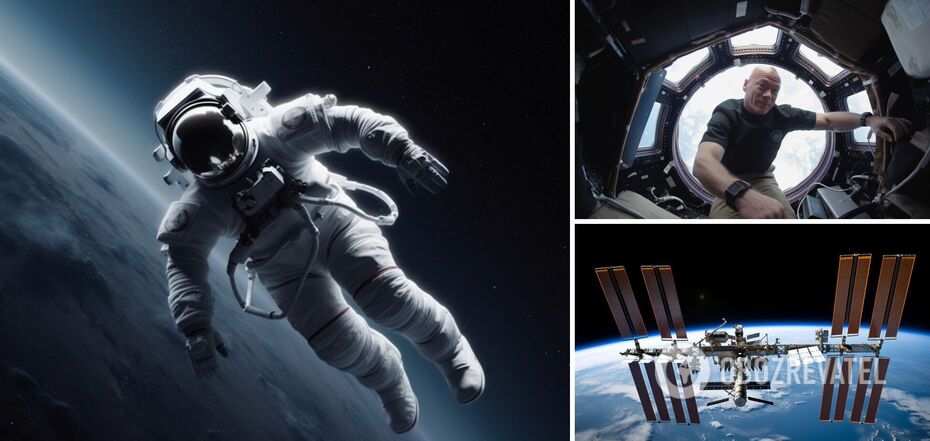Life
How the human body changes in space: the prognosis for muscles and bones is not good
The most optimistic predictions are that the colonization of Mars will take place in the near future. China, for example, plans to launch crews to the red planet as early as 2033, and NASA has set a rather ambitious goal of sending astronauts before the late 2030s or early 2040s.
On the one hand, colonization looks quite promising, given the problems of overpopulation, global warming, extinction of biodiversity and melting glaciers. But are such space missions safe for the human body? What happens to human vision, muscles, immunity and DNA in space, told Live Science.
Muscles
One of the biggest obstacles to long-term spaceflight is microgravity, a state of near weightlessness in which astronauts swim and can easily push heavy objects through the air. Muscles will receive very little stimulation, actually starting to weaken and even collapse quickly. NASA has published a study that says astronauts could lose up to 20 percent of their muscle mass after spending just five days in microgravity. The lower extremities, trunk and muscles responsible for supporting posture would be particularly affected.
Loss of bone mass
After being in space, human bones become more susceptible to fractures and osteoporosis. The effects of weightlessness on each individual bone are different and depend on the location of that bone in the body. According to an analysis published in the journal Microgravity, the bones of the lower extremities and lumbar spine can lose up to 1% of their mass per month, but the density of skull bones can actually increase. According to a 1995 review published in Acta Astronautica, because bone tissue degrades rapidly in space, it can release a stream of minerals into the bloodstream, increasing the risk of hypercalcemia (excessive calcium levels), which, in turn, can lead to kidney stones. .
Vision problems
The nerves emanating from the back of the eye can change in microgravity and then deform when they return to Earth.
According to a 2009 review published in the Annals of the New York Academy of Sciences, gravity helps keep the eyeballs in the correct position and allows them to rotate in the eye sockets. According to a 2006 study published in the journal Human Physiology, these eye movements can be impaired in microgravity.
Prolonged exposure to microgravity can lead to a degenerative condition called neuroocular syndrome.
Back
Microgravity also affects the human spine very strongly. It lengthens the spine, causing it to straighten. NASA reports that astronauts can even "grow" in space by about 7.6 cm.
Scientists reassure: short-term space travel will not cause much damage. However, excessive exposure to microgravity can lead to unavoidable consequences.
Reduced immunity
Space radiation, microgravity and the general physical and mental stress associated with space travel can weaken astronauts' immune systems and make them more susceptible to infections and systemic diseases.
According to a 2021 review published in npj Microgravity, prolonged exposure to microgravity can reduce the number and function of macrophages, a type of white blood cell that kills harmful microbes and regulates the actions of other immune system cells. Weightlessness has a profound effect on macrophage metabolism, growth and reproduction.
Increased risk of blood clots
The heart also works under the Earth's gravity. It is the force of gravity that "pulls" the blood downward, causing the heart muscle to contract.
Microgravity can increase the risk of dangerous blood clots. Research suggests that this risk may arise because microgravity is associated with reduced blood flow throughout the body and an increased presence of blood clotting factors.
Heart disease and insulin resistance
According to the NASA Twins Study, sometimes the space environment will increase overall levels of inflammation in the body, which has been linked to cardiovascular disease and insulin resistance.
The scientists conducted an interesting study. Two twin brothers were astronauts. One day the first, Scott, was sent on a space mission and the second, Mark, was left on Earth. Researchers compared levels of cytokines, proteins in the brothers' blood that indicate inflammatory responses. They found that Scott's body was more susceptible to inflammation in microgravity than Mark's on Earth.
DNA damage
Astronauts face an increased risk of DNA damage, according to a 2017 review published in the journal npj Microgravity. This is attributed to the effects of cosmic radiation and microgravity.
Gut condition
Scientists have found that astronauts have a less diverse population of gut microbes compared to humans on Earth, and often have a greater number of bacterial species contributing to gut inflammation.
In addition, a 2023 study on mice, published in the journal Cell Reports, demonstrated that spaceflight-induced changes in the gut microbiome could accelerate the rate of bone mass loss in microgravity.
Changes in brain structure and activity
Weightlessness causes the cerebrospinal fluid to shift. This is the aqueous substance that softens and provides nutrients to the brain and spinal cord. Changes in brain structure and activity may still be observed months after the astronauts returned to Earth. At the same time, scientists are not sure how harmful these changes might be to human health.
Earlier OBOZREVATEL told that SpaceX showed the first colony of people on Mars.
Subscribe to OBOZREVATEL channels in Telegram and Viber to keep up with the latest developments.



























